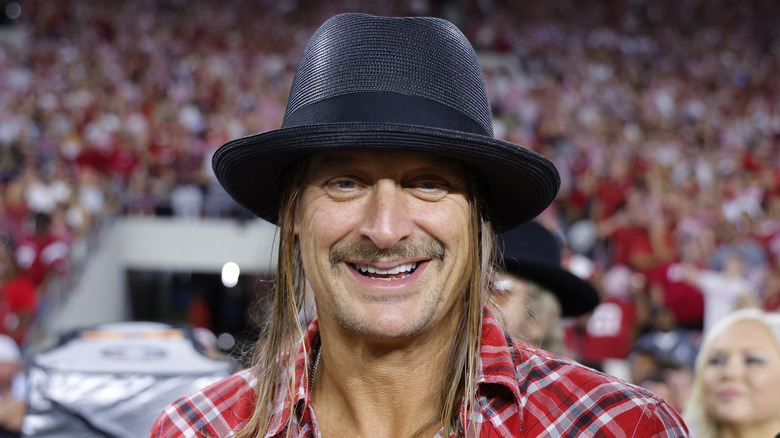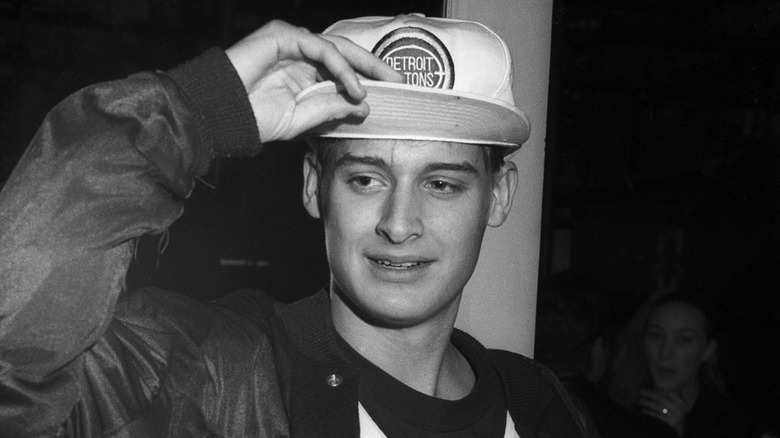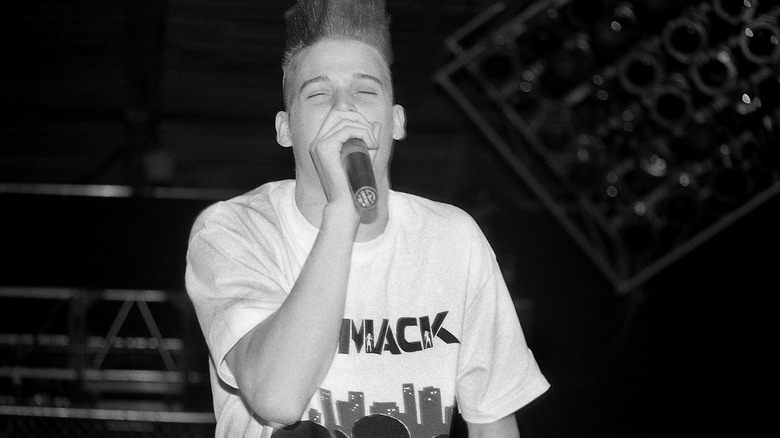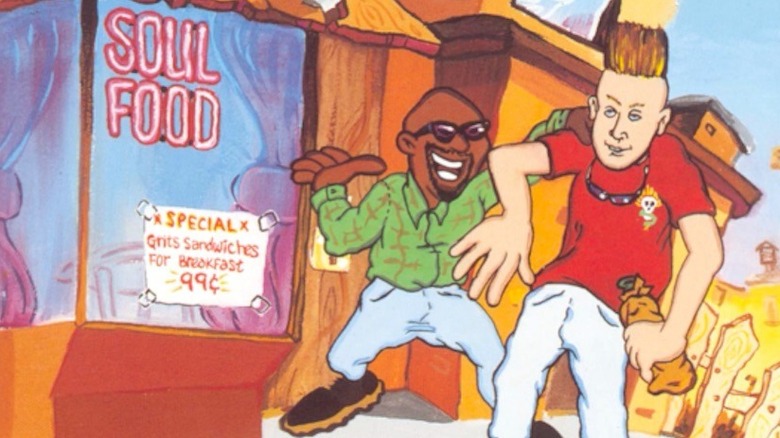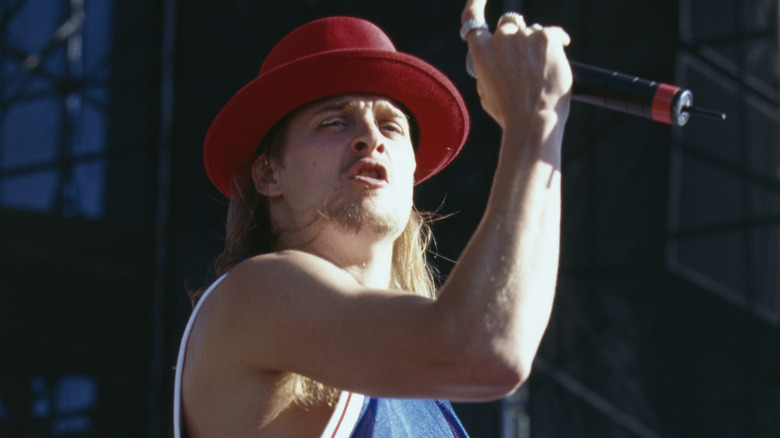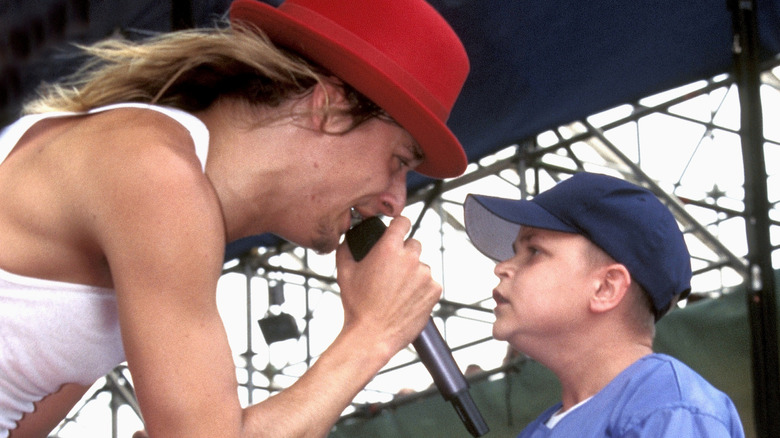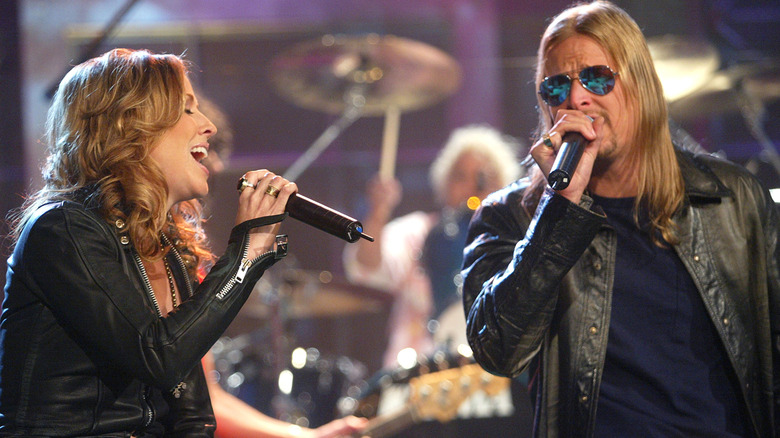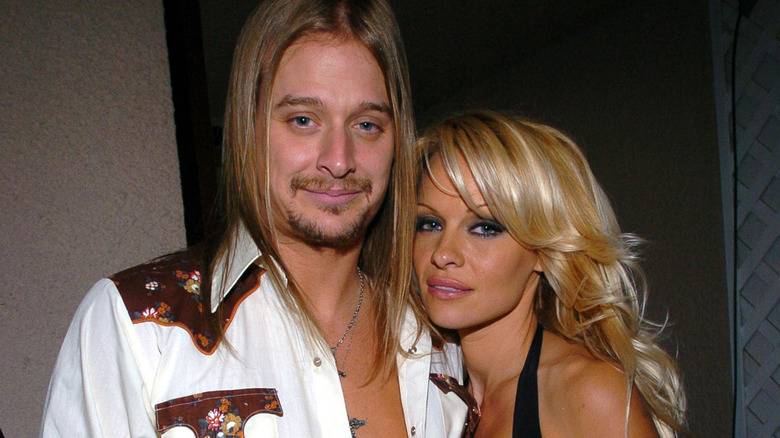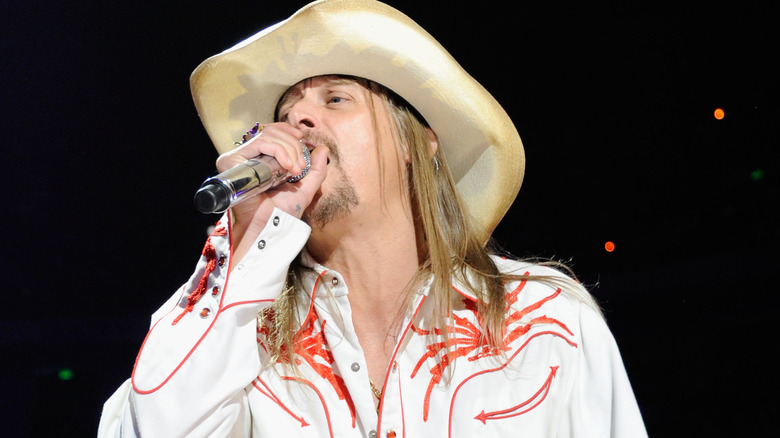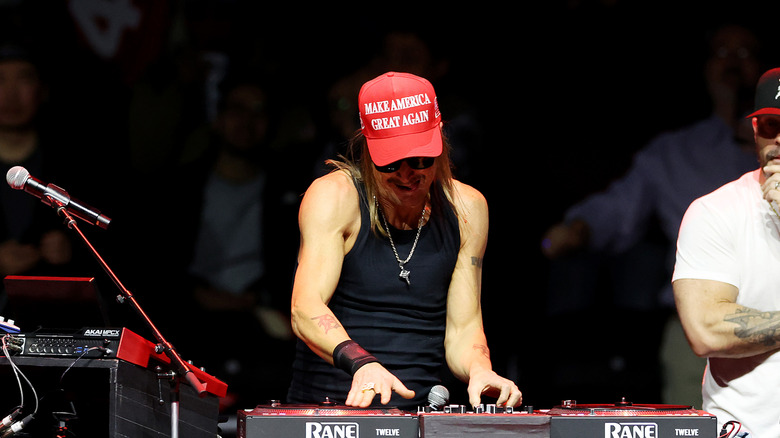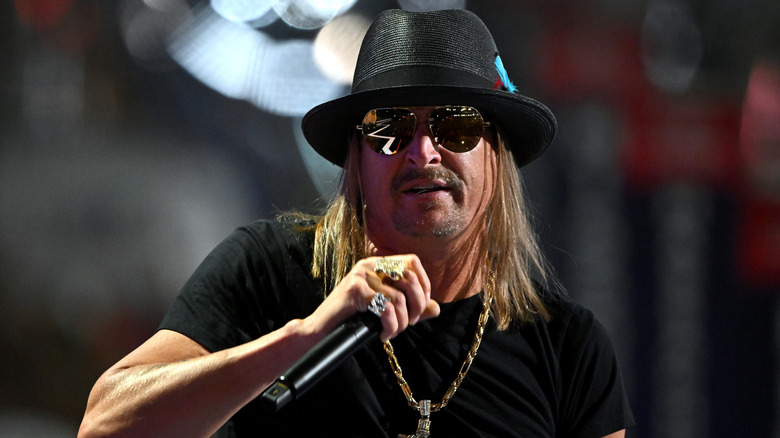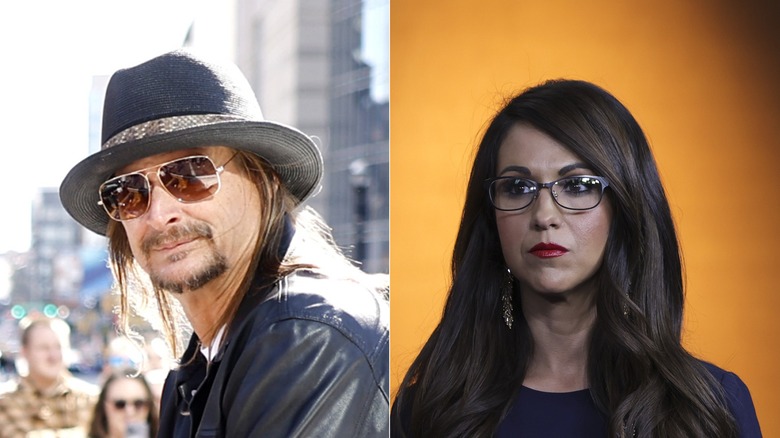The Transformation Of Kid Rock: From Local Star To MAGA Rocker
It's fair to say that the ongoing journey of Kid Rock has taken some twists and turns that nobody could have predicted when he first emerged in the Detroit hip-hop scene back in the 1990s. Back then, he was a local rapper on the rise, ready to explode nationwide and then internationally. Melding elements of rock, country, and other genres to his rap sound, Kid Rock has remained a fixture on the music scene for decades, and tumult has accompanied him along the way.
Over the course of his career, he's taken some unexpected side roads in an ever-evolving music career that's certainly experienced ebbs and flows. Yet, it has been his personal life that has dominated headlines, from his relationship with former "Baywatch" star Pamela Anderson to his admiration for the Make America Great Again movement of controversial President, Donald Trump.
Find out more about the transformation of Kid Rock: from local star to MAGA rocker.
He grew up in a wealthy family
Before he was Kid Rock, he was Robert James Ritchie, son of successful Detroit auto dealer Bill Ritchie and his wife Susan. Growing up in an environment of relative privilege (his dad owned a few car dealerships), the future Kid Rock and his family lived in a sprawling 5,660-square-foot home situated on a five-and-a-half-acre ranch outside of Detroit. Boasting five bedrooms and seven bathrooms, other amenities in the Ritchie family home included a five-car garage, swimming pool, regulation tennis court, and a horse barn.
"I had a very, very comfortable upbringing, and I'm not ashamed at all to say I was raised in a very upper-middle-class family," Kid Rock said of his childhood when interviewed by Cowboys & Indians. "My father likes to joke that I'm the only rock star he knows of who doesn't have to support his parents."
Meanwhile, Kid Rock was surrounded by music from an early age, courtesy of the Friday-night parties his parents often threw in the barn. "I was one of those guys that worked 60, 70 hours a week, and when Friday came, we let loose," his father, Bill Ritchie, told Rolling Stone. "I built this party room and I was the disc jockey, and I'd blast '60s rock 'n' roll." That barn, in fact, was also the site of Kid Rock's first performance, where the six-year-old stood atop the bar and belted out "Bad, Bad Leroy Brown" while pretending to play a faux guitar.
Kid Rock got his start in hip-hop as a member of the Beast Crew
As a teenager, Kid Rock began listening to rap music and soon began rapping himself. He teamed up with some like-minded kids to form a rap group, The Beast Crew, in the mid-1980s. "You could tell his father wasn't happy about him being around kids from the inner city," Wesley "Wes Chill" Gandy, a Detroit rapper who first met Kid Rock when he was 14, told Rolling Stone. "But his father really was upset about him pursuing rap."
It was while part of The Beast Crew that Kid Rock met D-Nice, who rapped alongside KRS-One and DJ Scott La Rock in Boogie Down Productions. He was impressed with the young aspiring rapper. After exiting The Beast Crew and going solo, he eventually nabbed a gig opening for Boogie Down Productions. He was also putting his raps down in demo recordings. Producer Mike E. Clark cut some of those early demos in the 1980s and admitted he was initially dubious that an affluent white kid could rap. "But he shut me up," Clark told the Detroit Free Press. "He had his turntable, had his beats, his stuff already written. He had his s*** together and blew me away."
That was how Kid Rock got his stage name. As American Songwriter recalled, people began turning up at his shows to see "that white kid rock."
He began experiencing success as a solo rapper in Detroit
Embracing the Kid Rock moniker, his fanbase in Detroit began growing. Joe Nieporte ran the 1,800-seat Ritz theater and recalled the aspiring young rapper approaching him about putting on a show there. "He came in pretty cocky: 'I'm going to fill this place,'" Nieporte told the Detroit Free Press. "We did the gig and he put 1,200 people in there. I was blown away."
While his success was growing as he made a name for himself in the Detroit rap scene, Kid Rock's father remained skeptical of his son's choices. "There was not a lot of support there, and I understand why," Kid Rock told Cowboys & Indians. "I was very young, and I'm on the other side of town doing parties and shows with turntables and these things. And they were like, 'You don't even play an instrument. What are you doing?'"
Despite that lack of parental support, he persevered. "At a young age, I knew I had this bug and I knew I was prepared to work hard enough no matter how long it took," he explained. Besides, he added, he really didn't have anything else he was interested in doing and hadn't demonstrated any other marketable skills or talent. "I didn't have anything to fall back on," he said. "Failure wasn't really an option."
He signed a record deal and released his first album at 19
Kid Rock was still a teenager, just 17, when he signed with Jive Records. In 1990, Jive released his debut album, "Grits Sandwiches for Breakfast." To say it wasn't an overnight sensation is putting it mildly; listing the effort as one of its "20 Terrible Debut Albums by Great Artists," Rolling Stone described the album as being "so insistently generic it's like he tossed everything current about hip-hop in 1990 into a giant colander and sifted out all the individuality."
His time with Jive proved to be fleeting. As Mike E. Clark told the Detroit Free Press, the popularity of another white rapper led Jive to drop him from the label. "[In 1990] Vanilla Ice came out and stunk things up. So Jive decided they didn't want a white rapper anymore," he said.
Kid Rock was undeterred, and his fanbase continued growing. "A few more people would show up every time I went to a place. And that was kind of a gauge for me, telling me that if we're getting more people here each time, then I'm doing something right," the rapper told Cowboys & Indians. He began producing his own albums independently, 1993's "The Polyfuze Method" and "Early Mornin' Stoned Pimp," released in 1996. "It really didn't happen for me probably until when I put out an independent record with a small loan and sold 14,000 copies out of my basement," he recalled.
He signed with Atlantic and hit the big time with Devil Without a Cause
Kid Rock's self-released albums generated a lot of buzz in Detroit. That did not go unnoticed by Andy Karp, vice president of A&R at Atlantic Records, who attended one of Kid Rock's shows and was blown away. "You could tell right then and there, he was playing in front of 60 people, that he had the charisma to play arenas," Karp recalled in an interview for the label. As Karp recalled, Kid Rock was well known throughout the music industry but was garnering little interest. "A&Rs were aware of who he was, but they just thought he was a joke," Karp said.
When Atlantic offered Kid Rock a record deal and a $150,000 advance, he immediately seized the opportunity that he'd been presented with. Recognizing that a major label was prepared to invest in him, he also felt the pressure of producing a major-label debut that would make an impact. "I finally had a real shot. I wasn't going to blow that," he told Cowboys & Indians. "The pressure was on, and I gave it everything I had."
The result of those pressure-cooker recording sessions was "Devil Without a Cause," in which his signature mix of rock and rap emerged, seemingly fully formed. Released in 1999, the album went on to sell 14 million copies on the strength of hit singles "Cowboy," "Bawitdaba," and "Only God Knows Why."
He grieved the loss of friend and collaborator Joe C
As Kid Rock established himself and what became his signature brand of party-hearty rap-rock, he set out to bring his live-performance skills to fans who only knew him from his albums. He began as an opening act for other artists until a high-profile slot at Woodstock 99 propelled him to tour as a headliner. A big part of his live shows in those days was Joseph Calleja, aka Joe C, who served as Kid Rock's onstage hype man in his band, Twisted Brown Trucker. Standing just 3-foot-9 (the result of severe celiac disease that required daily dialysis and much medication), his childlike appearance belied his foul mouth, which was on full display during Kid Rock's shows.
Interestingly, Calleja first entered Kid Rock's orbit as a fan. The rapper invited him onstage, and everything clicked. "Joe C made the band more exciting," Detroit rock musician Tino Gross recalled for the Detroit Free Press. "Bob was trying something new onstage, different people coming and going. But Joe C just stuck. Onstage, it was a beautiful thing."
Sadly, Calleja died in his sleep in November 2000, just as Kid Rock's career was catching fire. "We have lost a part of our family," Kid Rock said in a statement obtained by Rolling Stone. "He brought a smile to everyone who has ever known or seen him. In a world full of confusion, Joey made all of us laugh."
A ballad duet with Sheryl Crow expanded his fanbase
"Devil Without a Cause" may have been Kid Rock's fourth album, but it was his major-label debut that sent him skyrocketing to stardom. Its success, however, upped the ante — and the pressure — when it came to producing his follow-up, "Cocky," which arrived in 2001.
It was hardly the out-of-the-box hit that "Devil" was. Shortly after debuting in Billboard's Top 20, "Cocky" began tanking. Three singles were released, with none making nearly the same kind of impact as those from his earlier album. Kid Rock, however, battled his label by insisting the track "Picture" be released as a single. Atlantic execs, however, balked, thinking the sensitive, country-tinged ballad (a duet with singer-songwriter Sheryl Crow) was too far off base from the party-loving image his fans had come to embrace, worried it would damage his career.
The label, of course, was wrong. "Picture" rocketed close to the top of the charts, soaring to No. 4 on Billboard's Hot 100 and spending 34 weeks on the chart. Not only did it save "Cocky" from fading into obscurity, "Picture" remains his highest-charting single. Ultimately, Atlantic A&R vice president Andy Karp came to understand that "Picture" not only broadened Kid Rock's fanbase but also stymied efforts to pigeonhole him. "Now people think of him as someone who does all kinds of music instead of just an aggressive rap-rock guy, which will serve him much better in the long term," Karp told MTV.
He got engaged to, broke up with, married, and then divorced Pamela Anderson
Kid Rock met Pamela Anderson at a tribute concert for legendary Queen of Soul Aretha Franklin in April 2001. They got engaged in April 2003 but then split in June. "I dropped all contact with her," he said in a subsequent interview with Rolling Stone.
A few years later, in July 2006, the two reconnected in the South of France while aboard the yacht of a mutual friend and quickly rekindled their romance. "It was like we'd never been apart," Kid Rock gushed to People at the time. This time, he was ready to spring into action. "It was like, 'Let's just f***ing get married and get it over with," he told Rolling Stone. They wed at the end of that same month, exchanging vows in Saint Tropez, then again, this time marrying in Beverly Hills, and one more time in a Nashville bar.
Less than four months later, Anderson filed for divorce. She later confirmed the divorce came about because of Sacha Baron Cohen's "Borat" movie. "I didn't tell Bob I was in the movie, because I wanted to surprise him," she wrote in her memoir, "Love, Pamela" (via an excerpt in Rolling Stone). "I forgot about the part in the film that referenced the 'sex tape.' Bob stormed out, calling me a whore and worse. He was embarrassed, and his reaction was not thought through. After I chased Bob to his car, he peeled out, leaving me there alone," she continued, making it clear that her ex-husband had become one of the famous people Anderson absolutely can't stand.
Kid Rock shifted to country music and stirred up controversy with the Confederate flag
Over the years, Kid Rock followed a musical path that wasn't always predictable. The 2007 album "Rock n Roll Jesus" shed hip-hop and embraced a full-on Southern rock sound. The result was his first No. 1 album, selling a respectable 5 million copies. He made an even more dramatic shift in 2010 with the release of "Born Free," his first foray into country music. Kid Rock credited Rick Rubin — who'd also produced "Rock n Roll Jesus" — for nudging him into that new musical direction. "I've always had a love of country music," he added.
Meanwhile, there was one element of Kid Rock's stage shows that had not aged well: the Confederate flag. In 2011, he accepted the Great Expectations Award from the Detroit chapter of the NAACP. Outside the venue, however, protesters burned a Confederate flag, making clear their feelings about Kid Rock displaying it at his concerts. While accepting his award, he told the audience that he "never flew the flag with hate in my heart," via the Detroit Free Press.
Kid Rock's publicist, Nick Stern, told the newspaper that was the night he decided he'd stop using it. "That was the impetus," Stern said. "Since then, he's never flown it again." Kid Rock himself told Rolling Stone why he'd gravitated toward the flag. "I was using the Confederate flag because I love Lynyrd Skynyrd, and I think it just looks cool," he explained.
He embraced the MAGA movement during Donald Trump's first presidential campaign
When POTUS Donald Trump announced his candidacy for president back in 2015, Kid Rock was one of the first celebrities to come out in support. "I'm digging Donald Trump," he declared to Rolling Stone. "My feeling: Let the business guy run it like a business."
Ever since then, he's remained one of the celebs who are clear supporters of Trump. While he may not be one of the celebs who are members at Mar-a-Lago, Kid Rock performed at the 2024 Republican National Convention and Trump's 2025 inauguration. In a subsequent interview with Rolling Stone, he explained why he felt Trump should be in charge of the U.S. "You think I like Trump because he's a nice guy?" he said. "I'm not electing the deacon of a church. That motherf***er likes to win. He likes to cheat in his f***ing golf game. I want that guy on my team."
According to Kid Rock, he's well aware of Trump's polarizing effect and the risk that publicly supporting the controversial MAGA movement could have on his popularity with fans. "When I doubled down on it, I knew that could be a career ender," he added. "But I was betting that there were a lot of like-minded people out there."
He stormed offstage during a Nashville concert when the audience refused to applaud
Controversy and Kid Rock have walked hand in hand for decades, yet one of his strangest moments came in February 2025 while he performed in Nashville. Appearing as a special guest during a special birthday celebration for Bon Jovi's keyboard player, David Bryan. While singing the Creedence Clearwater Revival classic "Proud Mary," he became perturbed when the crowd refused to clap along as he'd instructed. "F*** them ... If you ain't gonna clap, we ain't gonna sing. That's how it's gonna go," he told the crowd after halting the performance, as seen in a fan-shot video taken by a member of the audience.
He resumed, continuing the song for a few more verses, yet the lackluster clapping clearly irked him. "You know what, f*** y'all. You ain't gonna clap, I'm gone," he said and then stormed off the stage.
Rumors emerged he was dating controversial MAGA congresswoman Lauren Boebert after splitting with his fiancée
A while after divorcing Pamela Anderson, Kid Rock moved on with Audrey Berry. After a seven-year engagement, the two reportedly broke up — with a source telling Us Weekly in February 2025 that they'd actually split up the year before. "He is venturing into the dating pool," the source said.
That appeared to be the case when Kid Rock was spotted with MAGA politician Lauren Boebert, with the two getting into a taxi at 2 a.m. after the two left a Washington, D.C. party together. TMZ offered more details, revealing that the rocker and the recently divorced Colorado congresswoman had hit it off while attending a party celebrating the inauguration of Donald Trump. "Lauren was totally transfixed by the rock star, yapping away, doing a little dance, and clapping like she was front row at his concert — basically giving Kid Rock all the hype he needed," the site reported.
When TMZ subsequently accosted Boebert and asked point blank if they were dating, she offered a coy response. "You're always asking about my dating life! Is it that fun and interesting?" she said, neither confirming nor denying they'd hooked up while Boebert leaned into those trashy Kid Rock romance rumors. "Y'all with all your stories, Mom won't stop asking for concert tickets, so, that's the problem I'm facing now."

